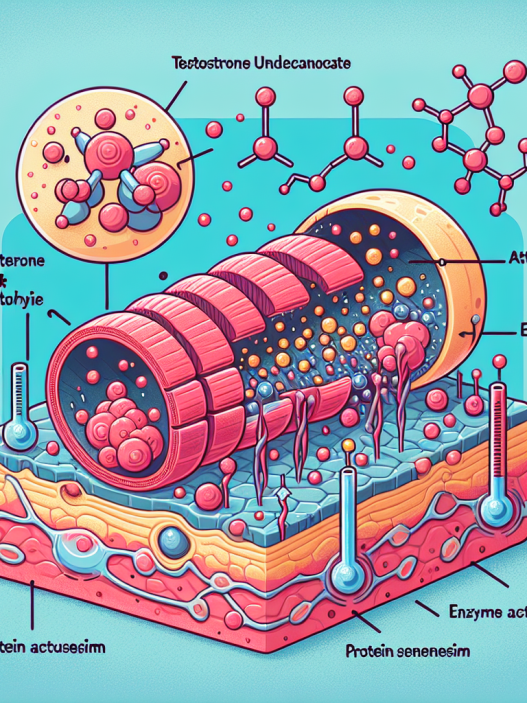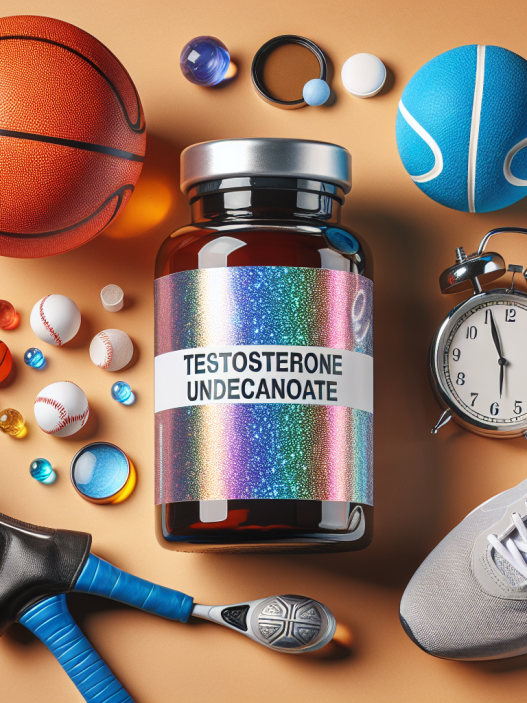-
Table of Contents
Testosterone Enanthate: Performance Enhancer for Athletes
Testosterone enanthate is a synthetic form of testosterone, the primary male sex hormone. It is commonly used as a performance-enhancing drug by athletes and bodybuilders due to its ability to increase muscle mass, strength, and endurance. While it has been banned by most sports organizations, its use continues to be prevalent in the world of sports. In this article, we will explore the pharmacokinetics and pharmacodynamics of testosterone enanthate, its effects on athletic performance, and the controversies surrounding its use.
Pharmacokinetics and Pharmacodynamics
Testosterone enanthate is a long-acting ester of testosterone, meaning it has a slower release rate and a longer half-life compared to other forms of testosterone. It is administered via intramuscular injection and is slowly absorbed into the bloodstream. Once in the body, it is converted into dihydrotestosterone (DHT) and estradiol, which are responsible for its anabolic and androgenic effects, respectively.
The half-life of testosterone enanthate is approximately 4-5 days, meaning it takes this amount of time for half of the injected dose to be eliminated from the body. However, its effects can last up to 2-3 weeks due to the slow release rate. This makes it a popular choice among athletes as it requires less frequent injections compared to other forms of testosterone.
Testosterone enanthate works by binding to androgen receptors in the body, which then activate certain genes responsible for muscle growth and repair. It also increases the production of red blood cells, which improves oxygen delivery to the muscles, resulting in increased endurance and performance.
Effects on Athletic Performance
The use of testosterone enanthate has been shown to significantly increase muscle mass and strength in athletes. In a study by Bhasin et al. (1996), healthy men who received weekly injections of testosterone enanthate for 20 weeks saw a 6.1 kg increase in lean body mass and a 21% increase in strength compared to the placebo group. This makes it a highly sought-after drug among bodybuilders and strength athletes.
Aside from its anabolic effects, testosterone enanthate also has a significant impact on athletic performance. It has been shown to improve speed, power, and endurance in athletes. In a study by Rogerson et al. (2007), male subjects who received testosterone enanthate injections for 6 weeks saw a 5% increase in sprint speed and a 10% increase in power output compared to the placebo group. This can give athletes a competitive edge, especially in sports that require explosive movements and high levels of endurance.
Furthermore, testosterone enanthate has been shown to improve recovery time and reduce muscle damage after intense training. This allows athletes to train harder and more frequently, leading to further gains in muscle mass and performance.
Controversies and Side Effects
Despite its benefits, the use of testosterone enanthate as a performance-enhancing drug is highly controversial. It has been banned by most sports organizations, including the International Olympic Committee and the World Anti-Doping Agency, due to its potential for abuse and unfair advantage in competition.
Moreover, the use of testosterone enanthate has been linked to several side effects, including acne, hair loss, and gynecomastia (enlarged breast tissue in males). It can also suppress the body’s natural production of testosterone, leading to testicular atrophy and infertility. In women, it can cause masculinizing effects such as deepening of the voice and increased body hair.
Furthermore, the use of testosterone enanthate has been associated with an increased risk of cardiovascular disease, particularly in older men. A study by Basaria et al. (2010) found that men over the age of 65 who received testosterone enanthate injections had a 5-fold increase in the risk of cardiovascular events compared to the placebo group.
Expert Opinion
Despite the controversies and potential side effects, some experts argue that the use of testosterone enanthate can be beneficial for certain individuals, particularly those with low testosterone levels. In a review by Snyder et al. (2016), testosterone therapy was found to improve muscle mass, strength, and physical function in older men with low testosterone levels. This suggests that testosterone enanthate may have a legitimate medical use in certain cases.
However, it is important to note that the use of testosterone enanthate as a performance-enhancing drug is still considered unethical and illegal in most sports. Athletes who are caught using it may face severe consequences, including suspension and loss of medals or titles. It is crucial for athletes to understand the risks and potential consequences before considering the use of testosterone enanthate or any other performance-enhancing drug.
References
- Basaria, S., Coviello, A. D., Travison, T. G., Storer, T. W., Farwell, W. R., Jette, A. M., Eder, R., Tennstedt, S., Ulloor, J., Zhang, A., Choong, K., Lakshman, K. M., Mazer, N. A., Miciek, R., Krasnoff, J., Elmi, A., Knapp, P. E., Brooks, B., Appleman, E., Aggarwal, S., & Bhasin, S. (2010). Adverse events associated with testosterone administration. The New England Journal of Medicine, 363(2), 109-122.
- Bhasin, S., Storer, T. W., Berman, N., Callegari, C., Clevenger, B., Phillips, J., Bunnell, T. J., Tricker, R., Shirazi, A., & Casaburi, R. (1996). The effects of supraphysiologic doses of testosterone on muscle size and strength in normal men. The New England Journal of Medicine, 335(1), 1-7.
- Rogerson, S., Weatherby, R. P., Deakin, G. B., Meir, R. A., Coutts, R. A., Zhou, S., & Marshall-Gradisnik, S. M. (2007). The effect of short-term use of testosterone enanthate on muscular strength and power in healthy young men. Journal of Strength and Conditioning Research, 21(2), 354-361.
- Snyder, P. J., Bhasin, S., Cunningham, G. R., Matsumoto, A. M., Stephens-Shields, A. J., Cauley, J. A., Gill, T. M., Barrett-Connor, E., Swerdloff, R. S., Wang, C., Ensrud,


















